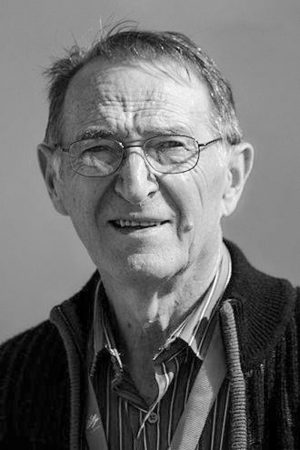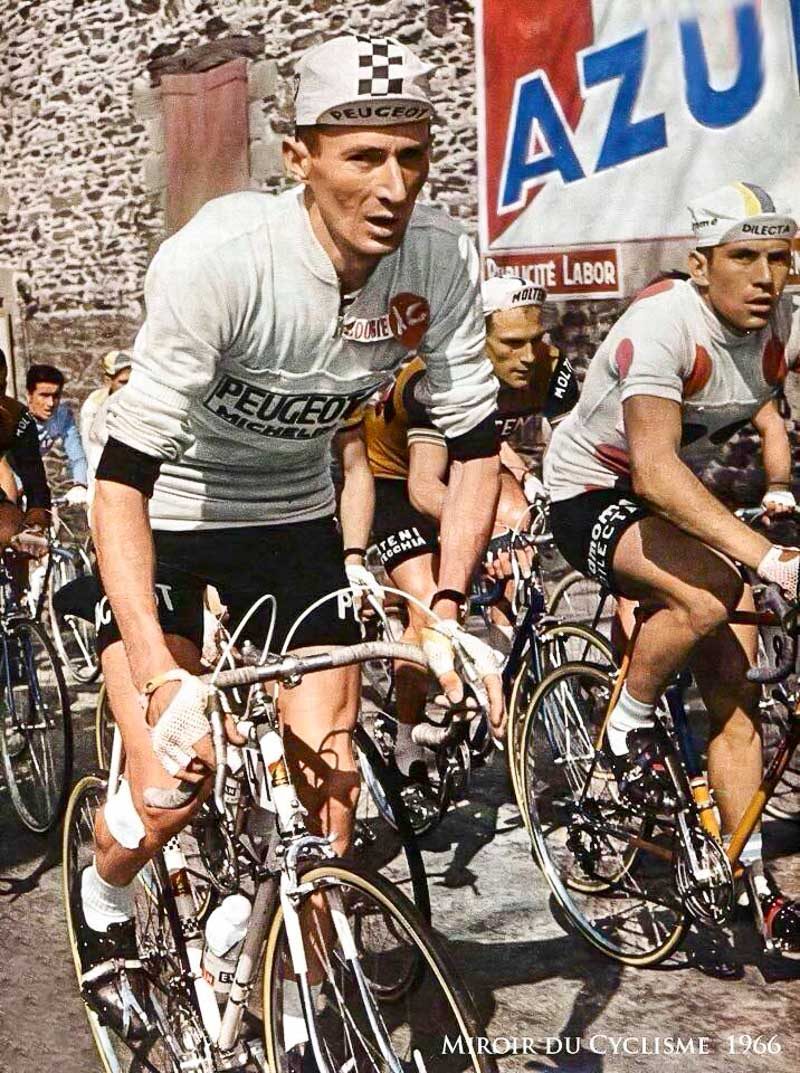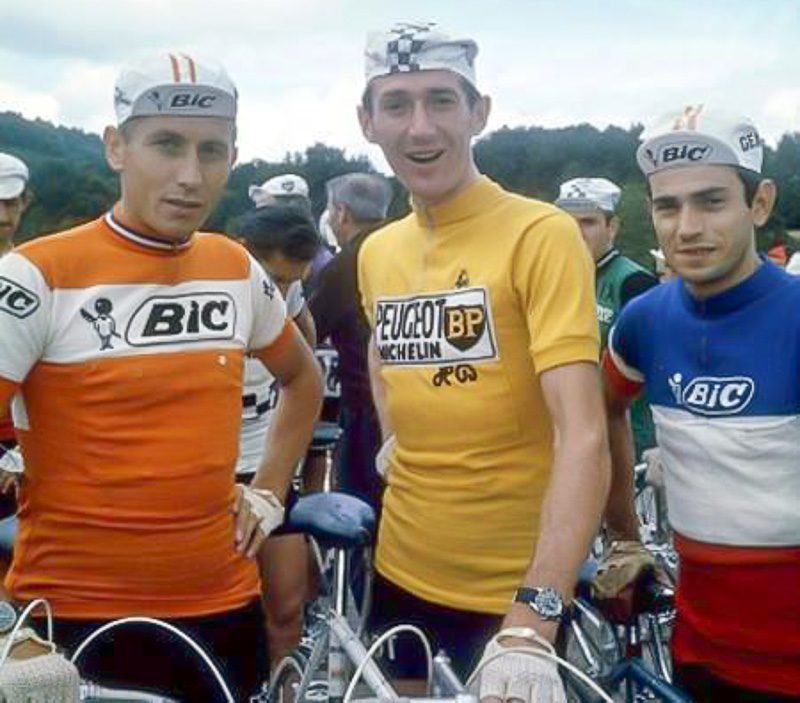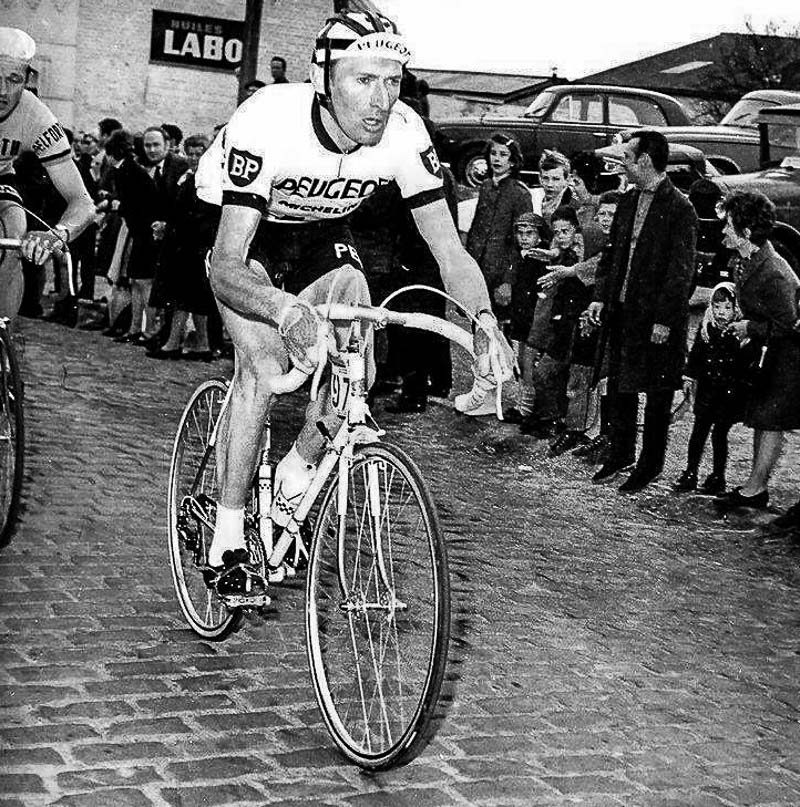
Following the death in February of 1956 Tour de France winner, Roger Walkowiak, France lost another of her Tour winning sons today when the death was announced of 1967 winner, Roger Pingeon from a heart attack in the village of Beaupont, Ain.
Gotha the ‘palmarès bible’ sums Monsieur Pingeon up thus;
“Talented road racer who only turned pro at the age of 24.
“As a soldier he spent over two years in Algeria.
“Although he was known as a very capricious man he often turned in marvellous performances.
“In 1966 after having abandoned in Paris-Nice and the Dauphine Libere, he announce he would stop racing, but a year later he won the Tour de France after an astonishing solo breakaway in the ‘Belgian Stage’ from Roubaix to Jambes.
“In 1969 he was one of the most valuable opponents of Merckx.
“A number of conflicts with the French Federation and health problems disturbed the final years of his career.”
Born August 28th 1940 of farming stock in Hauteville-Lompnes in the Ain Departement, a strong 1964 independent season with a win in the Poly Lyon and second in the GP des France saw him win a contract with that most French of French professional teams, Peugeot for 1965.

He took a highly promising 12th in the 1965 Tour de France, took sixth behind Jacques Anquetil in the epic GP des Nations 75 kilometre TT and finished second in the late season Italian semi-classic the Coppa Agostoni.
The following season he stepped up to eighth in Le Tour; took a stage and was third overall in the Criterium International.
Pingeon’s glory year was 1967 when he won the Tour, his victory was overshadowed by Tom Simpson’s death on Mont Ventoux on Stage 13 but the Frenchman had engineered his win on Stage Six.
The Peugeot man correctly guessed that the Belgians would go all out for a home win, he infiltrated the key break, jumped them to win the stage solo and put himself in yellow by six minutes – it was tactical brilliance.
Including his Tour stage and GC win he took nine wins that year.

He took two Tour stages in 1968 and finished fifth on GC – he also finished second in the French National Professional Road Race Championships that year.
There were a further two stage wins in the Tour in 1969 when he finished second on GC to Eddy Merckx who’s winning margin was a yawning 17 minutes 54 seconds.
But Pingeon also took his second Grand Tour that year, winning the Vuelta in the spring prior to the Tour, taking two stage wins along the way to putting two minutes into the late, great Luis Ocana.
He quit the Tour in 1970 after finishing second in the Dauphine.
His best rides in 1971 were third in the Coppa Agostoni, fifth in the GP des Nations and third in the Trofeo Baracchi with Bernard Thevenet.
His last season with Peugeot, 1972 saw him take a Dauphine stage and finish second in the Swiss Tour – with another DNF in Le Tour.
The 1973 season saw him in the colours of German team, Rokado but health problems meant a lean year.
Back with a French team, Jobo Lejeune for his final year, 1974 he took a respectable 11th in the Tour and won the GP Plumelec.

Pingeon was famously hypochondriac and a born worrier who had his own ideas on how to get the best from himself in a Grand Tour.
He bathed after each stage in a solution of hot water, vinegar and salt – which he believed would eliminate any germs.
He went to bed early and slept late in hotel rooms in which he’d ‘blacked out’ including blocking key holes to keep the light out and wore eye masks.
He’d also hardly stir from his bed on a rest day – his theory being that all of these measures would gain him a day’s worth of sleep over the course of the race and therefore a considerable advantage over his rivals.
In latter years the slim man with the hawk’s nose would become a TV pundit.
Monsieur Roger Pingeon, Tour de France and Vuelta winner and one of those characters who are all too scarce in the current world of cycling, rest in peace.
With thanks to Willy Wauthlé for the images.



